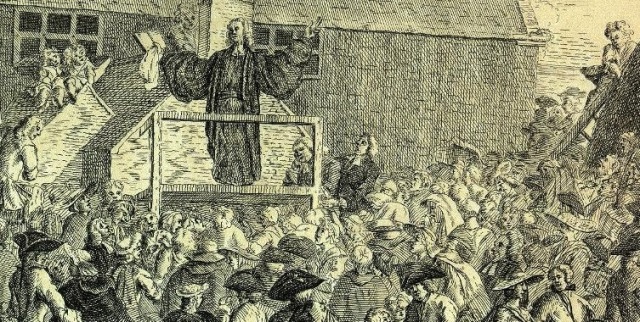Why John Wesley Matters for 21st Century Mission
(Here at the Missio Alliance blog we have been exploring “The Scandal of the Evangelical Memory”, and John Wesley is a key part of this history. Read this and be amazed at the Whole-Gospel of Charles Wesley.)
As thoughtful Christians ponder 21st century mission that impacts the whole person and society, it is instructive to go “back to the future” and consider the influence of the Methodist movement of the 18th century, led by John and Charles Wesley. The fervent, holistic and missional faith born in the Great Awakening still drives much of global evangelical Christianity. In this essay, the focus is on the tapestry of theopraxis that characterized the person and work of John Wesley.
Wesley, as other reformers and revolutionaries in Christian history, aimed to restore “primitive Christianity” – recapturing the vitality of the New Testament communities in his day. Wesley was unusually willing to cooperate and dialogue with Christians of other traditions. His work with Whitefield was instrumental in preserving the results of the latter’s large evangelistic meetings. Whitefield admitted that without the follow-through and organizing skills of the Methodists, all his efforts would have been “a rope of sand.” Wesley’s favorite Bible verse was Gal. 5:6: “What counts is faith operating through love.” While sharing the Lutheran and Reformed commitment to justification by faith alone as a gracious act of God – Wesley emphasized that true faith was proven – we might say “operationalized” – by loving obedience.
Wesley is often claimed by the sociopolitical Left and Right depending upon the particular context of his memorable sayings. Like all great thinkers and leaders, Wesley will not “package” neatly into any ideological camp. He is rightly credited to fostering movements that led to the conversion of over one million persons in his lifetime and incalculable social influence as followers labored for scores of economic and social improvements as part of their whole-life vision.
There are seven facets to Wesley’s vision that can assist our mission efforts in North America and beyond. These are instructive because they touch on poignant issues that impede or propel kingdom progress.
Eschatology and Kingdom Vision
Howard K. Snyder writes that, ‘Wesley’s vision was social and sacramental, with a strong future hope.” Wesley looked forward to the return of Christ as a living hope. In the meantime, he anticipated “providential increases” in kingdom influence as people were converted, walked in community and lived out the Sermon of the Mount in the power of the Spirit. This balance of hope and practical action energized the call to holiness and social change without utopian fantasies or dystopian fatalism.
How we see the future profoundly impacts our ethics and stewardship. Evangelicals must unite an urgent eschatology concerning the fate of each person and the hope of the Second Coming with wise stewardship of the ecology and economy of our planet. Bifurcation of the spiritual/social or the ecstatic/ethical was unthinkable for Wesley…and hopefully for mature believers in the 21st century.
Evangelization – the call to Christ
 Wesley was a powerful preacher and called his audiences to repentance and faith, to personal trust in the grace of Jesus Christ. Wesley believed that God’s prevenient grace was working in unbelievers, softening hearts and preparing them to accept the message. Personal conversion through justifying grace begins the believer’s life in the kingdom. Sanctification (a huge topic for another article!) is the pilgrimage to Christian perfection and real progress is possible.
Wesley was a powerful preacher and called his audiences to repentance and faith, to personal trust in the grace of Jesus Christ. Wesley believed that God’s prevenient grace was working in unbelievers, softening hearts and preparing them to accept the message. Personal conversion through justifying grace begins the believer’s life in the kingdom. Sanctification (a huge topic for another article!) is the pilgrimage to Christian perfection and real progress is possible.
St. Francis did NOT say, “Preach the gospel at all times, and if necessary, use words.” Today’s “Red Letter Christians” (most are not reading all the red letters) are often substituting social action for fervent proclamation. They hope that their good works will spark interest and conversation and that some will join them on their “journey” (another overused word). Wesley’s integrated vision eschews this separation of proclamation and action and his theology of salvation made decisions for Christ a matter of urgency.
The 21st century Church in North America needs a renewal of Spirit-empowered proclamation that convicts of sin and compels trust in the atoning work of Christ. Relevance is not an excuse to dilute the heart of the message that transforms women and men change whole nations.
“Enthusiasm”
Authentic experience of the Spirit was central to Wesleyan spirituality. Ecstasies of grace were validated by ethics of love. Wesley believed that God worked through dreams, visions and the spiritual gifts; however, these needed testing by Scripture and validation by praxis. Experiences of transcendent joy united with wise incarnational sobriety were marks of mature Evangelical life.
The North American “evangelical pot of goo” – the consumer-centric, performance and program-driven public events – that is the norm for many evangelicals needs enlivenment by the Spirit, moments of spontaneous inspiration and more participation by the entire congregation. Global Christianity outside the West – and among Charismatics and Pentecostals in the West – is much more Wesleyan than most of the churches in the West that identify with Methodism!
Empowerment – all Christians active in God’s work

The Methodists were accused of being dangerous “levelers” in a classist society. This is reminiscent of the 3rd century critic Celsus who despised Christian gatherings because they allowed females, the uneducated and the lower classes equal participation. In Methodist meetings, women prayed and “prophesied” publically (they were told to speak for fifteen minutes, pause for prayer, then prophesy again for another fifteen minutes…thus not “preaching”!). Methodist insistence on generosity, thrift, holiness and community concern prompted exponential improvements in the lot of working and middle-class members. Methodists also credentialed lay preachers/workers, sparking controversy from clerical elites.
John Wesley always respected ecclesial authority and structure, even as he transformed it. Education and maturation of thought were a vital part of his efforts. But the empowerment of the Spirit and the urgency of evangelization created new avenues for charismatic leaders.
Today’s church must include well-educated leaders that empower “the whole church to take the whole gospel to the whole world.” (Christopher Wright) Weekly meetings are a response to the call of God to come and adore the Trinity. They are also moments of commissioning as God’s people receive fresh insights and strength to fulfill their callings.
Ecumenism
Wesley’s famous Letter to a Roman Catholic captures the heart of true ecumenical cooperation among communities that believe the Gospel and worship the Triune God:
Let us endeavor after every instance of a kind, friendly, and Christian behavior toward one another…to say all the good we can both of and to each other…with the most endearing expression that is consistent with love and sincerity…Let us endeavor…to help each other in whatever we are agreed leads to the kingdom…O let you and I (whatever others do) press on to the prize of our high calling!
Arminian or Reformed, high- or low-Church, egalitarian or complimentarian, with congregational, presbyterian or episcopal polity, house churches or mega-churches, cathedrals or chapels, urban, suburban, exurban or rural…Wesley is our master-teacher regarding the disposition toward unity that is critical for Gospel witness in a hostile world.
Ethics that Engage Society: Love in Action
Wesley taught that every regenerated believer has a new disposition and thus the potential for holy love and personal discipline. Methodists did not create categories of personal and social ethics – they were part of the seamless garment of grace that characterized true Christian community. Marquardt states this eloquently:
“Wesley’s theological dialectic, which appropriately placed Paul and James side by side, made it possible…to emphasize justification by faith alone (against Anglican legalism, which accused him of fanaticism) and the necessity of good works (against any mystical or pietistic quietism). It is through this synthesis that Wesley laid the foundation for his social ethics.”
Methodists did not write checks anonymously – they personally engaged with helping the poor in the name of Jesus.
Wesley opposed slavery with all his being and the Methodist movement condemned the practice in the late 18th century, assisting Wilberforce and others in eliminating this social evil.
Wesley worked tirelessly for justice in all domains, including education, sanitation (“cleanliness is next to godliness” meant clean water and housing) and political reforms that would prevent the nobility from getting even richer from government pensions!
21st century advocacy for justice must integrate personal responsibility with social policy, spiritual transformation with institutional change. Anything less becomes oppressive.
Economic Wisdom
“Earn all you can, save all you can, give all you can.” Wesley’s three-point plan was a challenge for his hearers. At the end of his life he lamented that Methodists did the first two well, but needed promptings for the third!
Wesley’s economic teaching affirmed property rights and protection for laborers. He believed in productive work, but not at the expense of health and family. Giving includes church and foreign missions…and alleviating poverty. He excoriated the over-emphasis on luxury goods at the expense of basics for the working class. At the same time he opposed high taxation and favoritism for some enterprises at the expense of others. In short, Wesley affirmed the dignity of the person, the rule of law and private property while affirming that a spiritual legacy is worth so much more than a bank account.
As we navigate the intersection of faith, work and economics, it is vital that 21st century believers avoid the perils of extreme individualism and collectivism. God’s world is designed for all to flourish without oppressing others. Access to markets, legal systems that are just and opportunity to used one’s gifts and abilities are all part of the Wesleyan vision we can appropriate for our local and global efforts.
In my book, Flourishing Churches and Communities, Wesley’s insights are prominent as I call believers to consider economic flourishing in light of the great Commission and Great Commandment.
A Call to Reflection and Reorientation
I hope these brief comments elicit thoughtful reflection and purposeful action in all our communities. Joyful worship, disciplined spirituality, hard work, ethical transformation and missional concern unite in the efforts of John Wesley. By God’s grace, may they find fresh expression in our 21st century decisions.
